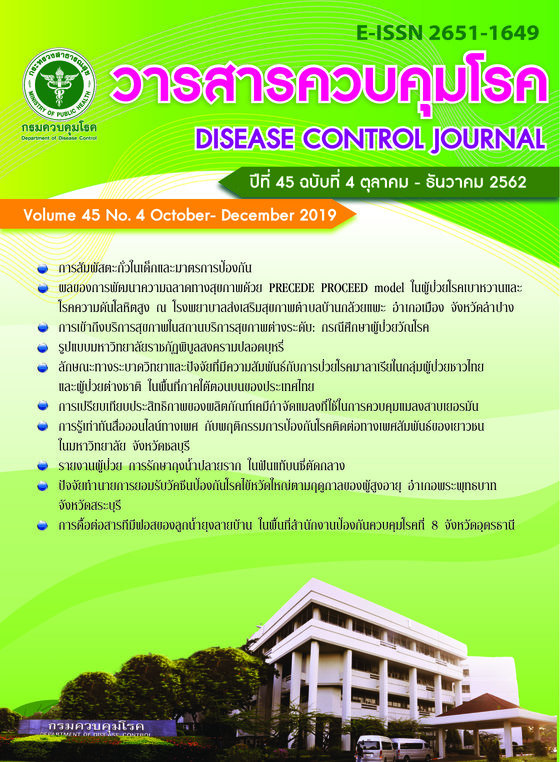Comparative efficacy of insecticide products for control of German cockroaches (Blattella germanica)
DOI:
https://doi.org/10.14456/dcj.2019.36Keywords:
Blattella germanica, contact toxicity test, cypermethrin, chorpyrifos, fipronil, chlorfenapyrAbstract
Bioefficacy of four selected insecticidal products used for cockroach control was conducted against adult females of the German cockroaches (Blattella germanica) to determine contact toxicity rates. Test substances were cypermethrin 25% w/v EC, chlorpyrifos 40% w/v EC, fipronil 5% w/v SC, and chlorfenapyr 24% w/v SC tested at dosages of 0.1, 0.25, 0.1 and 0.25 g a.i./m2, respectively. Treatment rates were determined according to World Health Organization (WHO) testing recommendations or product label instructions. These products were tested separately against B. germanica using surface contact exposure method. Test cockroaches were exposed to insecticide treated 20 cm2 glass sheet with 4 separate exposure events at 5, 10, 30, and 60 minutes. Both cypermethrin and fipronil were highly effective against B. germanica, providing quick knockdown and killing actions after a 5-minute exposure to the insecticide treated panels with 4.27 and 3.87 minute KT50 values respectively, resulting in 100% mortality. Chlorfenapyr required a 10-minute exposure to achieve 100% mortality with KT50 value of 9.46 minutes, whereas chlorpyrifos required 30 minutes to achieve 100% mortality but the KT50 could not be calculated. Toxicity comparison of the four insecticidal products tested against B. germanica decreased in the order of fipronil ~ cypermethrin > chlorphenapyr > chlorpyrifos.
Downloads
References
2.Atiokeng Tatang RJ, Tsila HG, Wabo Poné J. Medically Important Parasites Carried by Cockroaches in Melong Subdivision, Littoral, Cameroon. J Parasitol Res 2017;2017:7967325.
3. Raghavendra K, Barik TK, Sharma P, Bhatt RM, Srivastava HC, Sreehari U, et al. Chlorfenapyr: a new insecticide with novel mode of action can control pyrethroid resistant malaria vectors. Malar J 2011;10:16.
4. World Health Organization. WHO specifications and evaluations for public health pesticides– Chlorfenapyr. Geneva: World Health Organization; 2017 [cited 2018 Dec 28]. 37 p. Available from: https://www.who.int/whopes/quality/Chlorfenapyr_specs_eval_WHO_December_2017.pdf
5. Sathantriphop S, Ya-umphan P, Mukkhan P, Paeporn P, Suphapathom K. Bioefficacy of formulated insecticide products against adult Blattella germanica, the German cockroach. J Health Sci 2017;26:930-6. (in Thai)
6. World Health Organization. Pesticides and their application – For the control of vectors and pests of public health importance. 6th edition 2006. Document WHO/CDS/NTD/WHOPES/GCDPP/2006.1.
7. Abd-Elghafar SF, Appel AG, Mack TP. Toxicity of several insecticide formulations against adult German cockroaches (Dictyoptera: Blattellidae). J Econ Entomol 1990;83:2290-4.
8. Kaakeh W, Reid BL, Bennett GW. Toxicity of fipronil to German and American cockroaches. Entomol Exp Appl 1997;84:229-37.
9. Ahmad I, Suliyat A. Development of fipronil gel bait against German cockroaches, Blattella germanica (Dictyoptera: Blattellidae): laboratory and field performance in Bandung, Indonesia. J Entomol 2011;8:288-94.
10. Nasirian H, Ladonni H, Vatandoost H. Duration of Fipronil topical application toxicity in Blattella germanica field population strains. Pakistan J Biol Sci 2006;9:800-4.
11. Oxborough RM, N'Guessan R, Jones R, Kitau J, Ngufor C, Malone D, et al. The activity of the pyrrole insecticide chlorfenapyr in mosquito bioassay: towards a more rational testing and screening of non-neurotoxic insecticides for malaria vector control. Malar J 2015;14:124.
12. Rahayu R, Ahmad I, Ratna ES, Tan MI, Hariani N. Present status of carbamate, pyrethroid and phenylpyrazole insecticide resistance to German cockroach, Blattella germanica (Dictyoptera: Blattellidae) in Indonesia. J Entomol 2012;9:361-7.
13. Nodez SMM, Rafatpanah A, Khosravani M, Hakak FS, Paksa A. Susceptibility status of German cockroaches, Blattella germanica (L.) to carbamate and pyrethroid insecticides within surface contact method in Shiraz city, Iran. J Entomol Zool Stud 2018;6:1043-6.
14. Zhai J, Robinson WH. Pyrethroid resistance in a field population of German cockroach, Blattella germanica (L.) Japan J San Zool 1991;42:241-4.
15. Limoee M, Davari B, Moosa-Kazemi SH. Toxicity of pyrethroid and organophosphorous insecticides against two field collected strains of the German cockroach Blattella germanica (Blattaria: Blattellidae). J Arthropod Borne Dis 2012;6:112-8.
16. Stock T. Model integrated pest management plan for Oregon schools [internet]. 2017 [cited 2019 Jan 17]. Available from: https://www.pleasanthill.k12.or.us/shop/wpimages/phsd-ipm-plan-2017.pdf
17. Dingha BN, O'Neal J, Appel AG, Jackai LEN. Integrated pest management of the German cockroach (Blattodea: Blattellidae) in manufactured homes in rural North Carolina. Florida Entomological Society 2016;99:587-92.
Downloads
Published
How to Cite
Issue
Section
License
Articles published in the Disease Control Journal are considered as academic work, research or analysis of the personal opinion of the authors, not the opinion of the Thailand Department of Disease Control or editorial team. The authors must be responsible for their articles.






